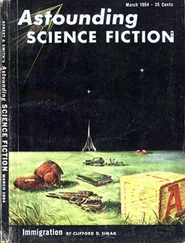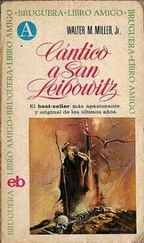Her eyes pleaded with him. “Mayn’t an old tumater woman forgive Him just a little for His Justice? Afor I be asking His shriv’ness on me?”
Dom Zerchi swallowed a dry place. He glanced down at her bicephalous shadow on the floor It hinted at a terrible Justice — this shadow shape. He could not bring himself to reprove her for choosing the word forgive. In her simple world, it was conceivable to forgive justice as well as to forgive injustice, for Man to pardon God as well as for God in pardon Man. So be it, then, and bear with her, Lord, he thought, adjusting his stole.
She genuflected toward the altar before they entered the confessional, and the priest noticed that when she crossed herself, her hand touched Rachel’s forehead as well as her own. He brushed back the heavy curtain, slipped into his half of the booth, and whispered through the grille, “What do you seek, daughter?”
“Blessings, Father, for I have sinned—”
She spoke haltingly. He could not see her through the mesh that covered the grille. There was only the low and rhythmic whimper of a voice of Eve. The same, the same, everlastingly the same, and even a woman with two heads could not contrive new ways of courting evil, but could only pursue a mindless mimicry of the Original. Still feeling the shame of his own behavior with the girl and the officers and Cors, he found it hard to concentrate. Still, his hands shook as he listened. The rhythm of the words came dull and muffled through the grille, like the rhythm of distant hammering. Spikes driven through palms, piercing timber. As alter Christus he sensed the weight of each burden for a moment before it passed on to the One who bore them all. There was the business about her mate. there were the murky and secret things, things to be wrapped in dirty newspaper and buried by night. That he could only make sense of a little of it, seemed to make the horror worse.
“If you are trying to say that you are guilty of abortion,” he whispered, “I must tell you that the absolution is reserved to the bishop and I can’t—”
He paused. There was a distant roaring, and the faint snort-growl of missiles being fired from the range.
“The Dread One! The Dread One!” whined the old woman.
His scalp prickled: a sudden chill of unreasonable alarm.
“Quickly! An act of contrition!” he muttered. “Ten Aves, ten Pater Nosters for your penance. You’ll have to repeat the confession again later, but now an Act of Contrition.”
He beard her murmuring from the other side of the grille. Swiftly he breathed an absolution: “Te absolvat Dominus Jesus Christus; ego autem eius auctoritate te absolvo ab omni vinculo…Denique, si absolvi potes, ex peccatis tuis ego te absolve in Nomine Patris…”
Before he had finished, a light was shining through the thick curtain of the confessional door. The light grew brighter and brighter until the booth was full of bright noon. The curtain began to smoke.
“Wait, wait!” he hissed. “Wait till it dies.”
“wait wait wait till it dies,” echoed a strange soft voice from beyond the grille. It was not the voice of Mrs. Grales.
“Mrs. Grales? Mrs. Grales?”
She answered him in a thick-tongued, sleepy murmur.
“I never meant to… I never meant to… never love . . .love…” it trailed away. It was not the same voice that had answered him a moment ago.
“Now, quickly, run!”
Not waiting to see that she heeded him, he bounded out of the confessional and ran down the aisle toward the altar of reservation. The light had dimmed, but it still roasted the skin with noon sunglare. How many seconds remained? The church was full of smoke.
He vaulted into the sanctuary, stumbled over the first step, called it a genuflection, and went to the altar. With frantic hands, he removed the Christ-filled ciborium from the tabernacle, genuflected again before the Presence, grabbed up the Body of his God and ran for it.
The building fell in on him.
When he awoke, there was nothing but dust. He was pinned to the ground at the waist. He lay on his belly in the dirt and tried to move. One arm was free, but the other was caught under the weight that held him down. His free hand still clutched the ciborium, but he had tipped it in falling, and the top had come off, spilling several of the small Hosts.
The blast had swept him clean out of the church, he decided. He lay in sand, and saw the remains of a rose bush caught in a rockfall. A rose remained attached to a branch of it — one of the Salmon Armenians, he noticed. The petals were singed.
There was a great roaring of engines in the sky, and blue lights kept winking through the dust. He felt no pain at first. He tried to crane his neck so as to get a look at the behemoth that sat on him, but then things started hurting. His eyes filmed. He cried out softly. He would not look back again. Five tons of rock had tucked him in. It held whatever remained of him below the waist.
He began recovering the little Hosts. He moved his free arm gingerly. Cautiously he picked each of them out of the sand. The wind threatened to send the small flakes of Christ wandering. Anyway, Lord, I tried, he thought. Anyone needing the last rites? Viaticum? They’ll have to drag themselves to me, if they do. Or is anybody left?
He could hear no voices above the terrible roaring.
A trickle of blood kept seeping into his eyes. He wiped at it with his forearm so as to avoid staining the wafers with gory fingers. Wrong blood, Lord, mine, not Yours. Dealba me.
He returned most of the scattered Victim to the vessel, but a few fugitive flakes eluded his reach. He stretched for them, but blacked out again.
“JesusMaryJoseph! Help!”
Faintly he heard an answer, distant and scarcely audible under the howling sky. It was the soft strange voice he had heard in the confessional, and again it echoed his words:
“jesus mary joseph help”
“What?” he cried.
He called out several times, but no further answer came. The dust had begun sprinkling down. He replaced the lid of the ciborium to keep the dust from mingling with the Wafers. He lay still for a time with his eyes closed.
The trouble with being a priest was that you eventually had to take the advice you gave to others. Nature imposes nothing that Nature hasn’t prepared you to bear. That’s what I get for telling her what the Stoic said before I told her what God said, he thought.
There was little pain, but only a ferocious itching that came from the captive part of him. He tried to scratch; his fingers encountered only bare rock. He clawed at it for a moment, shuddered, and took his hand away. The itch was maddening. Bruised nerves flashed foolish demands for scratching. He felt very undignified.
Well, Doctor Cors, how do you know that the itch is not the more basic evil than the pain?
He laughed a little at that one. The laugh caused a sudden blackout. He clawed his way out of the blackness to the accompaniment of someone screaming. Suddenly the priest knew that the screaming was his own. Zerchi was suddenly afraid. The itch had been transmuted into agony, but the screams had been those of raw terror, not of pain. There was agony now even in breathing. The agony persisted, but he could bear that. The dread had arisen from that last taste of inky blackness. The blackness seemed to brood over him, covet him, await him hungrily — a big black appetite with a yen for souls. Pain he could bear, but not that Awful Dark. Either there was something in it that should not be there, or there was something here that remained to be done. Once he surrendered to that darkness, there would be nothing he could do or undo.
Ashamed of his fright, he tried to pray, but the prayers seemed somehow unprayerful — like apologies, but not petitions — as if the last prayer had already been said, the last canticle already sung. The fear persisted. Why? He tried to reason with it. You’ve seen people die, Jeth. Seen many people die. It looks easy. They taper off, and then there’s a little spasm, and it’s over. That inky Dark — gulf between aham and Asti — blackest Styx, abyss between Lord and Man. Listen, Jeth, you really believe there’s Something on the other side of it, don’t you? Then why are you shaking so?
Читать дальше








